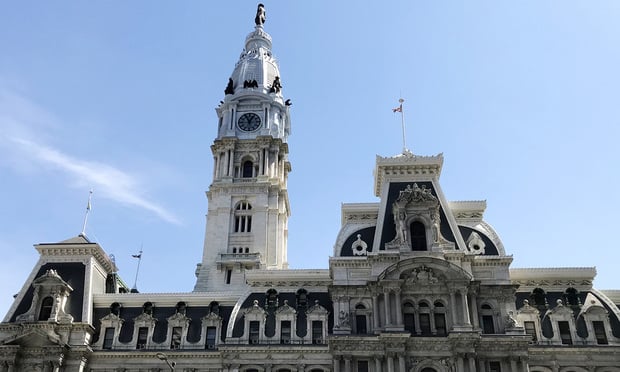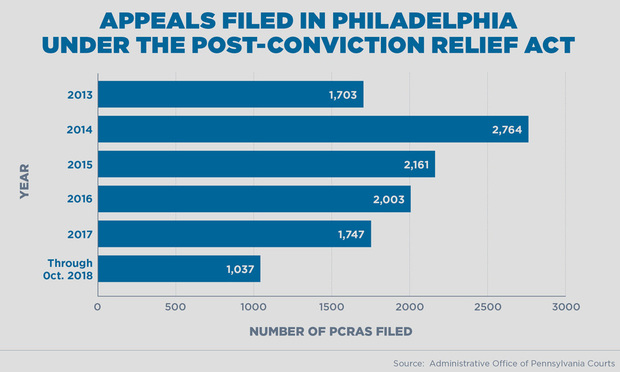Is Downward Trend for Post-Conviction Filings Likely to Continue Under Krasner?
According to the Administrative Office of Pennsylvania Courts, the number of PCRA cases being filed in Philadelphia has been trending downward since it peaked in 2014 with 2,764 petitions being filed.
January 11, 2019 at 02:11 PM
5 minute read
 Philadelphia City Hall building. Photo: Diego M. Radzinschi/ALM
Philadelphia City Hall building. Photo: Diego M. Radzinschi/ALM
Early last month, Philadelphia defense attorney Teri Himebaugh, who focuses on post-conviction appeals, emailed more than 20 colleagues, asking if they had any cases involving two homicide detectives who may have engaged in a “pattern and practice” of unconstitutional interrogation techniques that could affect numerous cases in Philadelphia.
The request was not unusual, but according to Himebaugh, the discussions she's been having with the Philadelphia District Attorney's Office have been. Himebaugh said the office, which just finished up its first year under criminal justice reformer Larry Krasner, has been much more receptive to claims alleging patterns of allegedly unconstitutional behavior, and seemingly much more willing to vet those claims.
“I've had more discussions with the DA's Office in the past year than I had in the prior 29 years,” Himebaugh said.
Himebaugh said she has already seen an upswing in work, and she expects the number of post-conviction appeals will likely increase as the office carries out this new approach.
Assistant District Attorney Nancy Winkelman, who is heading the Law Division, which handles all the appeals for the prosecutor's office, agreed.
“With policies of increased transparency and disclosure, we anticipate the number of PCRAs to increase,” she said recently in an emailed response to numerous questions last year.
Numbers provided by the Administrative Office of Pennsylvania Courts, however, provide a somewhat different story, and, according to several attorneys who focus on post-conviction appeals, the reasons for filing PCRA petitions are multifaceted and reach beyond the policy decisions by the prosecutor's office.
According to the office, the number of PCRA cases being filed in Philadelphia has been trending downward since it peaked in 2014 with 2,764 petitions being filed. That number was an increase of nearly 1,000 petitions over the 1,703 that were filed in 2013. According to the AOPC statistics, the number of petitions have slowly dwindled since 2014, with 2,161 being filed in 2015, 2,003 being filed in 2016 and 1,747 being filed in 2017.
As of October, only 1,037 had been filed in 2018, which put the year on par to have the lowest number of petitions filed in the past five years.

Attorneys who spoke with The Legal said that a variety of issues can factor into the number of PCRAs filed each year.
According to attorneys, there is a constant stream of petitions that get filed simply because prisoners are likely to continually challenge their convictions, however, outside events, such as media reports of police misconduct, judges' practices seen as problematic, or findings of misconduct by the police Internal Affairs Division typically trigger waves of new filings.
Bradley Bridge of the Defender Association of Philadelphia, who has been handling appeals involving allegedly corrupt police officers since 1995, said the 2014 spike was likely linked to the 2014 arrest of six officers from the Narcotics Field Unit on charges related to allegations that they falsified police reports; stole cash, drugs and personal property; and brutalized suspects.
Bridge, in an interview over the summer, said he filed notices raising post-conviction appeal issues in 1,400 cases stemming from those arrests. Bridge also noted that, soon after the controversy involving rapper Meek Mill came to light, raising credibility questions about a former Philadelphia police officer, his office filed about 300 post-conviction appeals citing the newly discovered allegations.
Bridge said he does not expect any changes from the Krasner administration will change how his office decides whether to file an appeal.
“I don't know whether people out there in the world will think differently of how Larry Krasner will review them or not, but it doesn't change it for me,” Bridge said.
Defense lawyer Barnaby Wittels also cited the recent U.S. Supreme Court decisions striking down life sentences for juveniles as likewise providing a steady stream of additional appeals to the system.
Defense attorney Rania Major-Trunfio said during an interview over the summer that, in the long term, she expects PCRA filings will decline, since, according to her and several other defense attorneys who've spoken with The Legal, the DA's Office has been offering lighter prison sentences and more diversionary programs.
“I think it's going to stay low, if not get lower,” Major-Trunfio said. “If you take a look at the cases in court this year, we are getting fairer offers out of the DA's office, and if there are fairer trials and more pleas, there will be less appeals and fewer PCRAs.”
Major-Trunfio, however, added there is a chance the filings will increase in the short-term, as some prisoners and attorneys might view the filing of a PCRA as a means to essentially re-open sentencing negotiations in cases that might have been problematic.
“They're much more willing to listen,” Major-Trunfio said. “They're looking at it from both sides.”
In answering questions over email, Winkelman, who took over heading the Law Division in January 2018, said she did not have any specific data comparing the Krasner administration's approach versus prior administrations. The main difference, she said, is that the Law Division is functioning more as a single entity, with attorneys from the formal appeals and federal litigation units also doing work that involves PCRAs. The PCRA unit, she said, also works closely with the Conviction Integrity Unit, which Krasner revamped soon after taking office.
However, when it comes to cases focusing on the more common claims about ineffective counsel, rather than allegations of broad misconduct, several attorneys said they have not seen any major changes.
“They're still fighting you tooth and nail on stuff that's not 100 percent, absolutely clear,” defense attorney Thomas Ferrant said.
This content has been archived. It is available through our partners, LexisNexis® and Bloomberg Law.
To view this content, please continue to their sites.
Not a Lexis Subscriber?
Subscribe Now
Not a Bloomberg Law Subscriber?
Subscribe Now
NOT FOR REPRINT
© 2025 ALM Global, LLC, All Rights Reserved. Request academic re-use from www.copyright.com. All other uses, submit a request to [email protected]. For more information visit Asset & Logo Licensing.
You Might Like
View All
High Court Revives Kleinbard's Bid to Collect $70K in Legal Fees From Lancaster DA
4 minute read
Judges Push for Action to Combat Increasing Threats Against Judiciary
3 minute read
Dispute Over Failure to Accommodate Disability Ends in $900K Settlement
3 minute read
Pa. Federal District Courts Reach Full Complement Following Latest Confirmation
Trending Stories
Who Got The Work
J. Brugh Lower of Gibbons has entered an appearance for industrial equipment supplier Devco Corporation in a pending trademark infringement lawsuit. The suit, accusing the defendant of selling knock-off Graco products, was filed Dec. 18 in New Jersey District Court by Rivkin Radler on behalf of Graco Inc. and Graco Minnesota. The case, assigned to U.S. District Judge Zahid N. Quraishi, is 3:24-cv-11294, Graco Inc. et al v. Devco Corporation.
Who Got The Work
Rebecca Maller-Stein and Kent A. Yalowitz of Arnold & Porter Kaye Scholer have entered their appearances for Hanaco Venture Capital and its executives, Lior Prosor and David Frankel, in a pending securities lawsuit. The action, filed on Dec. 24 in New York Southern District Court by Zell, Aron & Co. on behalf of Goldeneye Advisors, accuses the defendants of negligently and fraudulently managing the plaintiff's $1 million investment. The case, assigned to U.S. District Judge Vernon S. Broderick, is 1:24-cv-09918, Goldeneye Advisors, LLC v. Hanaco Venture Capital, Ltd. et al.
Who Got The Work
Attorneys from A&O Shearman has stepped in as defense counsel for Toronto-Dominion Bank and other defendants in a pending securities class action. The suit, filed Dec. 11 in New York Southern District Court by Bleichmar Fonti & Auld, accuses the defendants of concealing the bank's 'pervasive' deficiencies in regards to its compliance with the Bank Secrecy Act and the quality of its anti-money laundering controls. The case, assigned to U.S. District Judge Arun Subramanian, is 1:24-cv-09445, Gonzalez v. The Toronto-Dominion Bank et al.
Who Got The Work
Crown Castle International, a Pennsylvania company providing shared communications infrastructure, has turned to Luke D. Wolf of Gordon Rees Scully Mansukhani to fend off a pending breach-of-contract lawsuit. The court action, filed Nov. 25 in Michigan Eastern District Court by Hooper Hathaway PC on behalf of The Town Residences LLC, accuses Crown Castle of failing to transfer approximately $30,000 in utility payments from T-Mobile in breach of a roof-top lease and assignment agreement. The case, assigned to U.S. District Judge Susan K. Declercq, is 2:24-cv-13131, The Town Residences LLC v. T-Mobile US, Inc. et al.
Who Got The Work
Wilfred P. Coronato and Daniel M. Schwartz of McCarter & English have stepped in as defense counsel to Electrolux Home Products Inc. in a pending product liability lawsuit. The court action, filed Nov. 26 in New York Eastern District Court by Poulos Lopiccolo PC and Nagel Rice LLP on behalf of David Stern, alleges that the defendant's refrigerators’ drawers and shelving repeatedly break and fall apart within months after purchase. The case, assigned to U.S. District Judge Joan M. Azrack, is 2:24-cv-08204, Stern v. Electrolux Home Products, Inc.





